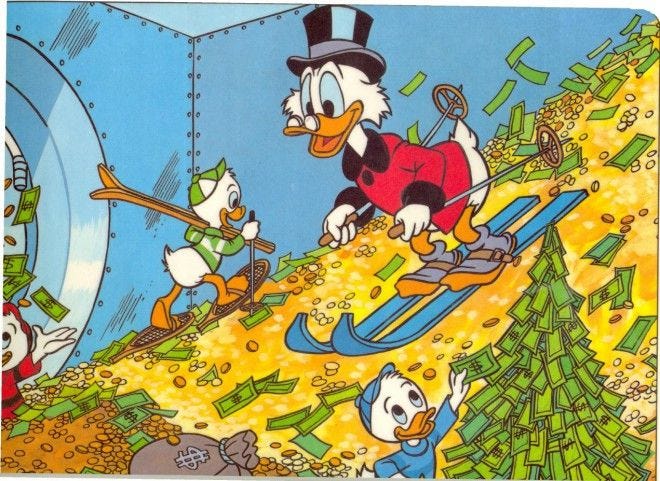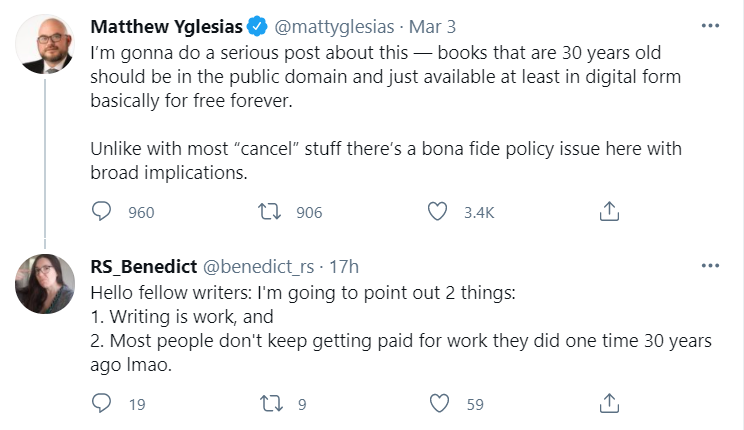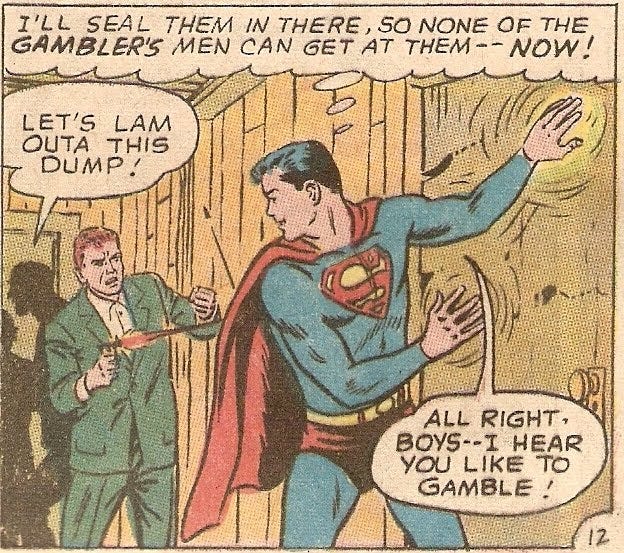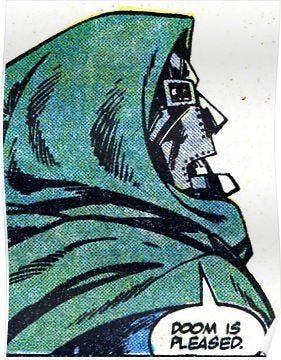Everyone Wants Art, No One Wants Artists to be Paid
Some thoughts on copyright, control, and "the discourse"
Lately, it seems the discourse—as the kids say—in my timeline is all about how authors should not be able to make money. There was a viral thread from a professor begging people to not pay substack writers (you can stick it to her here). There was an app that stripped out ads and text from online recipes (thankfully shut down). And then yesterday there was this (screenshotting with a characteristic response):
There was a whole lot of angry tweeting on all sides of this question, but I feel like much of it was confusing different things. Take the second tweet above. Most of the people who hopped on to agree with Yglesias’s tweet had some version of this argument. “Writing is work, but no other jobs pay you for work you did years ago! I don’t keep paying a burger flipper for the burger he flipped me twenty years ago!”
This line of argument fundamentally confuses the issue. Writing as a verb may or may not be “work,” but writing as a noun is intellectual property. Property, intellectual or otherwise, is not the same as wage work. If I buy a plot of land and build a house there to live in, no one would say that in 30 years Starbucks should be able to come along and say, “This is a coffee shop now!” I can’t go into your house and take whatever paintings or clothes you own that are 30 years old. Whether society should be fundamentally different is a separate question, but this simply isn’t how things work.
Writing (Verb) vs. Writing (Noun)
Writing (verb) is, in fact, often paid for like burger flipping. I have worked countless jobs for countless companies in which I was paid either an hourly wage or a onetime fee and that was that. I, like Mr. Burger Flipper, will never be paid for that work again. Not a year later and not thirty years later. I, like Mr. Burger Flipper, also have no control over how the product of my work is used. The customer can throw the burger in the trash without taking a bite. The freelance work I did can be scrapped or it could be used to generate (theoretically at least) millions of dollars of which I won’t even get a crumb.
Of course, I’m mostly talking about copywriting, sponsored content, and other writing that we don’t call “creative writing.” But it is true of the latter as well. I once wrote the majority of text for a book that my name does not even appear in. One time I was paid to write a (very very) short story for a beer company to publish on their beer cans.
And all of that is fine! I agreed to the fee for my work and that was that. But this is not the kind of writing we are talking about. We’re talking about writing (noun). More specifically, about authors who are in control of their own books.
Art Is a Gamble
When an author makes money off a novel they wrote years after publishing, that means it is work they did FOR FREE in order to retain their intellectual property rights. This is the trade off. This is the gamble. Artists make art for $0.00 dollars, and then later hope to sell the rights to book publishers, film companies, etc. (There are exceptions to this sometimes, like nonfiction books that get advances on proposals. But this is the general rule.) We write (verb) for free, then get paid later. Or not. Actually, most of the time not. Creative writing is a famously low paying career filled with rejection and dependent on side hustles. I won’t lament about that here. But suffice to say that no one is paying me to work on the short stories and novels I spend half my waking life on.
My work is not like a burger flipper or a doctor or a professor or a baker or any other profession where people are paid wages and salaries. But—again contrary to the Twitter takes—that doesn’t make art wholly unique.
Although I find this comparison a bit icky, working as an artist is closer to being an entrepreneur. You are putting in lots of unpaid work in the hope that down the line your “equity” in the company will be worth something. Also like entrepreneurship, you mostly accomplish nothing except going bankrupt and annoying your friends and family. I bring this up because a) I’ve been watching a lot of Shark Tank recently and a) to show that, despite what twitter says, plenty of people make money off work they did years ago. Indeed, countless companies that employee countless people are living off of work that their employees did years ago. They’re coasting on patents, trademarks, trade secrets, copyrights, etc. And that’s not even getting into things like stock options, landlords, and so on.
Copyright Is About Control
The second question that is ignored in this debate is the question of control. It may sound good to say that everyone should have free access to books—although I’m not sure why we pretend libraries don’t already exist?—but copyright is really a question of control. Does the author get to make decisions about their own writing or not? Should corporate publishers and Hollywood film studies be allowed to use art without paying the artist?
Because if a book an author wrote at age 25 is public domain at age 55, that doesn’t just mean that “anyone can read it free.” It also means that anyone can do whatever they want with it! Starbucks or the RNC could brand it and sell it. Some asshole could insert passages the author despises. Authors could no longer decide to not publish old work they dislike. Etc.
“But,” you say, “that doesn’t apply to most authors! Most books aren’t popular enough for people to even care about!” Of course. But by the same token, most people are not dying to read unpopular books from thirty plus years ago. It is only the popular works that are likely to have much of an effect either way.
Corporations Always Win
The bigger question for me is who actually benefits from shorter copyright. There are of course many small benefits one can imagine. But I feel pretty sure the biggest winner would be big corporations. I agree that the author’s life plus 70 years so that Disney can keep selling Mickey Mouse stuff is a bit absurd. But that doesn’t mean that shorter copyright undermines corporate control. Big corporations love to get work for free! They love to hold “contests” to get logos redesigned. They love to “crowdsource” content! They love to make money selling public domain books or adapting them for movies.
And they aren’t particularly hungry for new, original work.
Look at what dominates the TV and film landscape: Superhero movies based on characters created in the 1930s-1960s. Star Wars content spinning off a 1970s movie. Hell, even Harry Potter will be 30 years old in few years. Hollywood knows that even the worst franchise films (*cough* DCEU *cough*) make fist loads of money while even the best original IP has a good chance of failing.
In this landscape, a short copyright would just mean even Star Wars TV shows, Harry Potter books, and Marvel movies. If anyone could make them, everyone would. And new, original work would stand even less of a chance.








good to read all this, so thanks for putting your thoughts out there. hope your March has daffodils and blue skies. I think that the right to make derivative works should be protected differently from the original rights to publish a written work. Specifically, the economic copyright to publish a novel could last 30 years from 1st publication, but the right over derivative works could last longer, like 75 years from the 1st publication of the original work. I am not fixed on the amount of time, but the idea of separating out intellectual property over the original and derivative works helps to address the unfairness of the inherent monopoly in copyright, while rewarding the sweat and effort of the petite bourgeoisie-cum-precariat that live outside the normal employee-employer relation who occasionally make blockbusting properties.
i think the moral rights should last in perpetuity, so the right of attribution and against misattirubution, & authorial control over the integrity of the original work - these sort of rights - are not negotiable.
The equivalent in building - an architect does not get royalties when the building they designed gets resold. Maybe if their design gets used again, they do, but i doubt it. In sculpture, or painting, the artist does not get paid again when their work is resold. A self-employed plumber or electrician or bricklayer could foreswear their service fee for a royalty reflecting the intellectual property involved in creating part of a building perhaps for every resale for 100 years 1% of the sale price should go to the tradesperson, and their heirs. So i'm not 100% convinced that people who write words shoiuld be considered any differently from those entrepreneurs who lay pipes or carve stone, or paint canvas. anyhow - i am eating some potatoes and chili sauce, having a beer, and its so good that I'm pretty much agree with you about whatever it was we were talking about so, anyhow, hope uou well, all the best :)